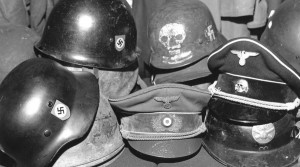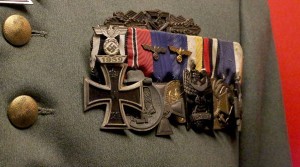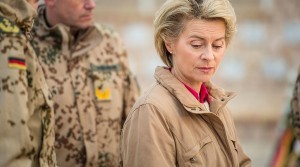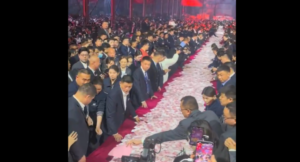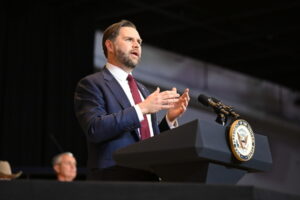It started with an investigation into a suspected terrorist plot by an army soldier aimed at top government officials. But it quickly uncovered a larger problem.
Military police searching through barracks turned up Nazi-era military memorabilia that revealed a much broader presence of far-right extremists in the German Army’s ranks, something commanders are now accused of having long ignored.
They are currently investigating 275 cases involving accusations of racism or far-right extremism stretching back six years, according to the Defense Ministry. The number represents a small minority in a force of nearly 180,000. But nearly 70 percent of cases have emerged in the last year and a half, pointing to an accelerating problem that German military authorities are only now scrambling to address.
“In the past, individual cases were always examined, but it wasn’t seen or understood that these cases are not isolated, but there are networks and connections, also to extremists on the outside of the armed forces,” said Christine Buchholz, a member of Parliament from the opposition Left party.
“Now it is glaringly obvious to everyone that this problem has existed for a long time and poses an immediate threat to people,” she added.
The revelations, in the middle of an election year, have set off sniping between the civilian and military authorities bordering on scandal. They have also added a disturbing new dimension to Germany’s effort to address a surge of extremist activity since the country took in nearly one million refugees in 2015.
With Europe facing a host of challenges — including populism and the propaganda machine of President Vladimir V. Putin of Russia — the investigation has revived questions about whether Germany can step beyond the shadow of its Nazi past and become a “normal” country, one that assumes a fuller leadership role on the Continent, including a military one.
In particular, the widening scandal has revived concerns about Germany’s shift to a volunteer force, which began in 2011. That step, some have warned, could narrow the ranks to youths susceptible to Nazi nostalgia, or to other extremists looking for free training and access to guns and ammunition in a country with strict weapons laws.
Starting in July, all applicants seeking to join the military will have to undergo a security check aimed at weeding out potential extremists. But that raises questions about how to handle those currently serving, at a time when the military is struggling to attract recruits.
Last week, the inspector general ordered a search of all military installations for displays of souvenirs or images glorifying the Nazi-era military, the Wehrmacht.
Michael Wolffsohn, a professor of modern history at the University of the German Armed Forces in Munich, says the decision to scrap the draft had driven the military from the center of society.
“As soon as society in general retreats from the armed forces, it opens the way and the place for fringe groups on one hand, and highly motivated idealists on the other,” Mr. Wolffsohn said.
“We have to ask ourselves if we can afford to leave the way open for extremists, not only right-wingers, but also Islamic and maybe even left-wing extremists.”
After World War II, the reconstituted German Army was formed in 1955 in the former West Germany as a conscription force, with the aim of ensuring peace by defending the national borders.
Since its founding, the military has instituted measures to distance itself from, and stigmatize, its Nazi-era antecedent. Since 1982, a 30-point decree has stipulated which traditions and norms guide the forces, and which do not.
Yet many barracks were built in the 1930s. A few, like the Rommel Barracks in the western city of Lippe, still bear the names of Hitler’s generals.
The shadow of that past informs much of what the armed forces can and cannot do. The Constitution limits them from taking part in any conflict, with the exception of missions led by allies. Only in 1994 did the constitutional court issue a ruling allowing the military to take part in armed missions led by either NATO or the United Nations.
The investigation stemming from the terrorism case came as military officials released a report detailing episodes of some soldiers’ extremist sympathies.
One soldier attached a Nazi-era war flag to the hood of his car and drove past a refugee shelter, while drawing his hand across his throat. Another posted a photo of two soldiers in SS uniforms to a chat group. A handful of others were reported to have shouted “Sieg heil” and “Heil Hitler.”
The episodes are among several dozen displays of far-right extremism, xenophobia or anti-Semitism that military officials investigated last year at the request of the Left party, which has long insisted that far-right sympathies in the military were part of a wider societal problem.
The soldier who drove past the shelter was discharged before he had completed his service, but a soldier who gave a Nazi salute was only reprimanded, leading to criticism that the armed forces were not taking the threat of extremism seriously enough.
Last week, the defense minister, Ursula von der Leyen, rankled many soldiers when she said, “The German military has an attitude problem, and it appears there are weaknesses in the leadership we must address systematically.”
But she has also come under fire for failing to address the very problems that she was pointing out. Members of the parliamentary opposition have questioned her connection to the troops she oversees and demanded an apology.
Ms. von der Leyen has since retreated from her statement, saying the majority of soldiers do an “outstanding job,” and Chancellor Angela Merkel has declared her “full support” for the minister.
The suspect in the terrorism case was arrested on April 27 after posing, improbably, as a Syrian refugee. He has been identified only as Franco A. in keeping with German privacy laws.
The day before his arrest, Ms. von der Leyen fired the military’s head of training after reports about hazing rituals and charges of sexual harassment from female recruits at several bases.
Last week, Ms. von der Leyen summoned 100 generals to Berlin for talks that resulted in a call to examine disciplinary measures and the hiring of an outside investigator.
On Wednesday, she testified about the affair before the defense committee in Parliament, vowing a thorough review and changes to disciplinary structures and how problems should be reported.
An initial investigation by the Defense Ministry found that Franco A.’s extreme-right sentiments had been known for years. As early as 2014, a master’s thesis he submitted at a French military academy where he studied drew the attention of his superiors for its nationalist, racist language.
Yet even after a review by the German authorities, who noted the “drastically extremist language” in his thesis, no disciplinary action was taken.
On Tuesday, federal prosecutors said they had arrested a second soldier, identified as Maximilian T., whom they suspect of plotting the attack with Franco A. They also said that the plot was aimed at prominent politicians, including former President Joachim Gauck, whom the suspects had derided as engaging in “failed” policies toward refugees.
Prosecutors said that the two soldiers, and a third suspect identified as a student from the western city of Offenbach who was also arrested last month, had intended “to contribute to the general sense of a threat” by staging a terrorist attack that would appear to have been carried out by a registered asylum seeker.
Ask me anything
Explore related questions
